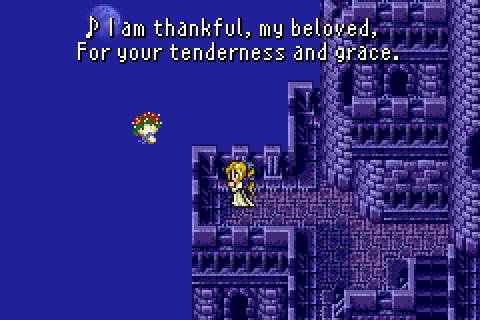Explainer by Matt S.
Last week I took a look at three of the key defining features that I felt characterised a good rhythm game. Perhaps surprisingly, none of those features was the music itself.
I’m going to do something similar this week in looking at the JRPG genre, because again I don’t think that one of the features that most people assume is key is in practice what differentiates a great JRPG from a lesser one. Many people assume that the way the genre uses statistics, as reflected in the combat system and the “levelling up” system, are what determines the quality of a JRPG. I disagree with this. I think that JRPGs need to have those quality systems by default, but what separates the functional examples of the genre from the truly wonderful are three features that are all narrative related.
This is because I believe that JRPGs are a storytelling medium first and foremost, and while a JRPG might have a simple story, if it’s not a good one, nothing about the gameplay will save it. With that in mind, here are the three critical components that I argue no JRPG can be great without:
To read on, please log in with your DDNet Premium account:
Increasingly we are seeing JRPGs offer more open worlds (the upcoming Final Fantasy XV is perhaps the most spectacular example of that), and in the modern era many, if not most of them, offer alternative endings to the quest. But they’re not really open, and I don’t think that even Final Fantasy XV will be as completely open-ended as most western open world games are.
There might be diversions while you’re on a quest, and the ending of the game might be determined by which of the dialogue choices you make, or how quickly you complete the game, or how many side missions you complete. But the actual flow through the story, right up until that ending cut scene, will typically be set in stone with each play through. And, even when the game offers open worlds, you’ll still be experiencing the main story line in a linear fashion – just with a little more room to explore along the way.
Why is this important to the JRPG genre? Because the JRPG genre is one in which authorial intent is critical to the overall experience. Playing a JRPG is more akin to reading a book than in most other genres. A storyteller – the game writer and/or director – has a specific story to share, and your job as the player is to experience that story, largely on the author’s terms.
Because the storyteller has such a level of control over the experience in a JRPG, it’s possible for JRPGs to offer richer, deeper stories than most other games. Let’s take a game like Dragon Age, Mass Effect, or Skyrim to highlight. These western RPGs have a far greater focus on freedom of experience, and making the player an active participant in the storytelling process. In those games, you have much more control over what you see and do, and now, because the creator can no longer assume that you’ve experienced specific pieces of information in your quest, or completed specific activities along the way, they can also no longer use the storytelling to build a networked web of information that develops the deeper you work into the narrative.
Conversely, the only reason a game like Nier works is because every cut scene and line of dialogue builds on what you’ve seen and done previously, and the only reason that Yoko Taro and his team knew that you’d seen and experienced what you had in Nier is because you were being driven through the narrative on a figurative straight line. Nier is a special experience because of the intensity and depth of the storytelling, more than anything else, and that which simply not have been achieved if you could play the game without seeing almost everything within it in a specific order.
2) JRPGs need characters to have real personalities
Because the narrative is so important to the JRPG, characters are also deeply critical to the experience. When you play Persona 4, are you really that invested in the combat, or even the world? It’s a very simple game visually, and while the combat is good, it’s nothing that you haven’t seen many times before.
No, Persona 4 is such a highly regarded game because of its characters, and it’s the appeal of those characters that has meant the franchise has been able to go beyond the JRPG genre. Consider this; would you recognise Persona 4 Arena or Persona 4 Dancing All Night as part of the Persona 4 franchise if they had new casts of characters? Of course not. It’s Yu, Risette and the gang that hold the entire series together.
We can have genuinely good characters in JRPGs because developers are, again, able to rely on the player experiencing the set sequence of events in the order laid out for them, and this helps to give the characters nuance. In Persona 4, every single player that picks the game up is definitely going to dive into Risette’s dungeon in their play through the game, and they are guaranteed to experience the dark side of her that struggles with her celebrity and sexuality. There’s no player choice in this dungeon either – we don’t get to make moral decisions with Risette or about her. The conclusion to the dungeon will always be the same. We come out the other end of that dungeon with a far deeper attachment to Risette, because the story writers were able to give you an intimate look into the character as part of the linear progression through the story. Furthermore, through the rest of the game there were references back to these events that are used to drive towards further character development, and these could only have been written into the game because the developers had complete confidence that all players had experienced them.
By contrast, in developing Dragon Age to be truly open, Bioware could never be quite sure what characters you’re playing through, and what you’re getting up to with them. The best the writers could do instead is give players a series of surface level insights into each character, independent of the broader narrative and world that the characters are in, before the game cuts back to the epic over-arching grand narrative that has been largely written without any assumptions on which allies the player has with them. That’s not to say that Dragon Age is a poor game, because it certainly has a lot of merit, but the difference between it and Persona highlights that the JRPG genre is such a powerful storytelling medium only because the developers can assume that players have a knowledge of the characters that is growing in a linear fashion as the plot advances.
To put it very generally, the western RPG is about the world, where the JRPG is far more intimate, and tends to be about a core group of individuals. A JRPG without stand-out characters cannot hope to be a memorable one.
3) JRPGs should reflect Japan
This one might sound quite obvious, but in practice it’s something we quite frequently lose sight of: JRPGs should reflect the Japanese culture and view on life. That’s not to say the game has to be made by the Japanese, but I would argue that there are no genuinely classic JRPGs that have been made by developers that don’t have an intimate understanding of Japan and its culture.
This is because the genre itself was constructed specifically to match with how Japanese people play games. Originally, the JRPG – back in the Final Fantasy 1 and Dragon Quest 1 days – was developed by Japanese teams as a way of translating the pen-and-paper and early-era western RPGs for the Japanese audience. This means that everything about the games, from mechanics through narrative, were effectively localisations of a genre to suit the aesthetics and thinking of a very different culture.
Modern JRPGs look and play very differently to those early era games, of course, but the way the genre has developed has built on those foundations and, more than any other genre perhaps, the JRPG has become a unique cultural artefact to the nation. That then goes some way to explain why, in the modern era, as storytelling has become more complex and nuanced, and therefore even more Japanese, the genre has resonated less strongly with western audiences and is now a niche genre. It’s not because the games are lacking for quality. Rather, it’s just that back in the SNES days truly complex storytelling was inhibited by technology and so the concepts being explored were relatively universal. By contrast, games like Nier and Persona 4 can no longer keep up with the Call of Dutys of the world for western audience mindset, because these games are now telling complex stories that are very esoteric to large numbers of western players.
A JRPG can have a light or minimalist narrative – consider roguelikes like Shiren the Wanderer, for example. But even then, when the game in question is minimalist, if it’s a good example of the genre, it is so because of these three narrative principles, rather than the more obvious features, such as their mechanics or feature sets. Shiren the Wanderer is a better roguelike than most roguelikes because Shiren is a superb character and the game is rich in Japanese cultural context.
As long as JRPGs continue to tell classic stories, the core appeal of them that got started right back in the early 80s will remain. The genre has evolved a great deal since those early days, but ultimately, the reason that we keep coming back to them is because of a principle that hasn’t really changed since those first examples of the genre; narrative.
– Matt S.
Editor-in-Chief
Find me on Twitter: @digitallydownld










